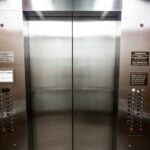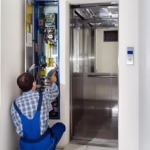Hydraulic elevators are often the go-to option for buildings that are mid-rise or have specific space and budget needs. They’re known for being reliable, especially in locations where speed isn’t the top priority. But just like any mechanical system, they need routine attention. If your building heavily depends on one or more of these elevators, it’s important to know when something doesn’t sound right. Unusual noises could be the first sign that something below the surface isn’t working as it should.
You might hear an odd clunk or buzz and wonder if it’s normal. Was it just a random sound, or is it something you should look into? Many property owners and managers brush these things off until the elevator stalls or someone files a complaint. Waiting too long can turn a minor issue into a full system failure. So, have you noticed any strange sounds coming from your hydraulic elevator recently?
Common Sounds And Their Causes
Hydraulic elevators make a few standard sounds just by how they work. Understanding what’s normal versus what isn’t can help you catch trouble early. During regular travel, you might hear a low hum from the pump motor or a steady whooshing noise as the fluid moves through the system. Quiet clicks can happen when the doors open or close. These sounds are part of everyday use.
But things start to shift when those noises become louder, uneven, or completely out of place. It might begin as a barely noticeable rattle and slowly grow into a metal-on-metal grind. That’s why it helps to make note of any odd or new sounds right away. Time of day, floor level, load weight — all of these details help technicians get to the root of the problem sooner.
Here’s a simple list to help you tell the difference:
- Soft pump hum – a normal noise as hydraulic fluid is pushed into the cylinder
- Whooshing or swishing – fluid movement, usually no concern unless it becomes erratic
- Clicks during door movement – standard sound unless it’s more like a slam
- Sudden loud rattle or bang – needs to be checked quickly, could signal a failing part
- Buzzing that grows over time – might mean an issue with the motor or electrical components
Start keeping a log whenever something sounds off. It doesn’t have to be detailed, just a few notes in a calendar about what you heard and when. This can be passed to your maintenance provider and save time during the inspection.
Grinding And Scraping Noises
Of all the sounds a hydraulic elevator can make, grinding or scraping shouldn’t be ignored. These noises don’t typically show up for no reason. Something as simple as wear and tear can lead to these sharp, uncomfortable sounds if moving parts rub against one another. Lack of lubrication is one possible cause. In other cases, it could point to more serious damage like a misaligned guide rail or cracked sheave.
Think about the way your car sounds when the brake pads are worn out. That same screech or grinding metal tone applies here. Elevators work in similar ways. And just like with brakes, if these warning signs are missed, the damage can spread.
Possible reasons for grinding or scraping include:
- Dry or unlubricated components
- Debris caught in the elevator shaft
- Loose fasteners or brackets coming into contact with moving parts
- Bad alignment in the rail system
- Worn-out bearings or guides
When you hear this kind of sound regularly or feel a change in the smoothness of the ride, stop using the elevator if possible and call for service. Letting it run could damage more than just the part causing the noise. Even if it still moves from floor to floor, using it while it’s grinding may shorten its lifespan and make future repairs more expensive. A trained technician should take a look, repair or replace the faulty parts, and make sure everything is safe.
Thumping Or Banging Noises
Thumping or banging sounds inside a hydraulic elevator usually aren’t something you can ignore. These noises may point to deeper issues in the operation of the system. Sometimes it’s the kind of sound you hear when the elevator comes to a stop a little too hard or starts moving with a jolt. It’s like someone slammed a door a few floors down. If this happens more than once, it’s time to reach out to a technician.
Thumps or bangs could be caused by air pockets or pressure surges within the hydraulic system. In older elevators or those that haven’t had recent servicing, the oil inside the cylinder might not be flowing right. When air mixes with oil, it creates uneven pressure, leading to jerky performance and loud bangs when the elevator stops too fast. There’s also the chance that piston rods, buffers, or anchor bolts have become misaligned or loose over time.
These noises may happen at a specific floor or location in the shaft. If the thumping always happens between the same floors, that’s a clue worth writing down. Paying attention to when and where you hear it helps the technician narrow things down quicker and get the elevator back in action faster.
It doesn’t take a system failure for these noises to be a problem. Even if the elevator is still running, regular banging can damage other parts or make people feel unsafe. It can also be a warning sign that something bigger is on the way. Calling in a technician early can save time and money later on.
Unusual Motor Noises In Hydraulic Elevators
The motor in a hydraulic elevator should sound pretty steady. It’s normal to hear a smooth humming tone when it starts. What’s not normal is when that hum turns into a buzz, whine, or crackle. This might happen suddenly or slowly build over time. Either way, it’s a sign that something might be wrong with either the electrical or mechanical side of the motor.
A buzzing noise could come from loose wiring or a bad electrical connection. If that sound is paired with shaking or rattling near the machine room, you might have loose brackets or fasteners. A whining noise could mean damage to motor bearings. These issues don’t always shut the elevator down right away, but they shouldn’t be ignored. Electrical problems, in particular, can mess with safety systems and make the elevator unreliable.
Watch out for:
- High-pitched whine at start or stop
- Electrical humming that didn’t exist before
- Rattling or vibrating sounds near the machine area
- Motor running longer than normal to complete a trip
- Sudden spikes in noise when changing direction
These changes might not happen on every ride. Sometimes it takes a heavier load or more trips in a row for the sound to show up. That’s why taking note of patterns over a few days is helpful. A qualified technician can test the motor, check all parts, and make sure your elevator gets the attention it needs before things get worse.
When Sounds Are a Sign to Act Fast
Strange sounds in a hydraulic elevator are often warning signs. From grinding and scraping to banging and buzzing, they shouldn’t be shrugged off. Even if the elevator still works, ignoring these noises could lead to bigger breakdowns, unexpected downtime, or safety issues for everyone using the elevator.
An elevator is built from many connected systems. When one part starts having trouble, it doesn’t stay isolated. A loud bang might be from a piston issue, but that problem might cause wear on something else if you let it continue too long. Sounds help you spot issues before they grow.
Knowing what you’re hearing is step one. Fixing the problem safely is when it’s time to hand things off to the experts. Professional technicians know how to track down the source, make repairs, and look for hidden damage.
A quiet elevator is a good elevator. If yours is starting to sound different, even if it’s still doing its job, pay attention and get it checked. It might be a simple fix now, but left untreated, it’ll cost a lot more later. Getting ahead of the noise keeps things running smoother and makes sure your building stays safe and comfortable for everyone.
For those managing properties with hydraulic elevator systems, regular maintenance and prompt attention to unusual sounds are key. At Kaiser Elevators, we understand the importance of keeping your elevators running smoothly and safely. Learn how expert care for your hydraulic elevator can help prevent costly breakdowns and keep tenants and visitors moving without interruption.

